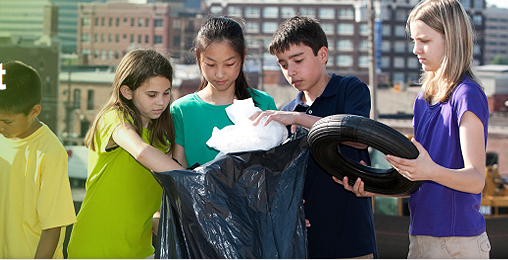"Our choices at all levels -- individual, community, corporate and government -- affect nature. And they affect us." -- David Suzuki
November 15 was America Recycles Day, and a great reminder about how important recycling is not only for the environment, but for jobs and the economy as well. Recycling is one of the fastest growing industries in the country, contributing more than $100 billion to the U.S. economy each year and employing nearly 138,000 people.
Recently I spoke with Robin Wiener, president of ISRI (Institute of Scrap Recycling Industries) on some of the lesser-known ways to help recycle, and some key benefits. This type of recycling, which individuals can help with by properly recycling electronics, can reduce new mining and has other sustainability benefits.
Electronics recyclers provide comprehensive recycling operations. Some of the commodities that can be extracted from electronic equipment -- in particular, steel, aluminum, gold, silver, titanium, copper, nickel, plastic, and glass -- are used as valuable raw material in the manufacture of new products.

Recycling drives for things like batteries, electronics, and other items can be a great way for kids to get involved in recycling and the environment. Photo courtesy of AmericanRecyclingDay.org
- Recycling 1 million laptops saves the energy equivalent to the electricity used by 3,675 U.S. homes in one year.
One metric ton of circuit boards can contain 40-800 times the amount of gold and 30-40 times the amount of copper mined from one metric ton of ore in the U.S. E-scrap can offer a materially higher metal loading/tonne compared to ores -- in particular as ore grades for new mines continue to decline. For example, a primary mine for silver contains approximately 5 grams of pure metal/ton of ore. This compares to 200-250g/ton of silver in PC circuit boards, and 300-350g/ton of gold in cell phones. (Source: Barclays 23 Aug 2012, Equity Research). When recycling electronics, look for a certified recycler, with R2 or R2/RIOS certification.- Recycling cell phones provides access to modern communications technology to many people in developing economies who would not otherwise be able to afford it.
Some collection programs donate cell phones to charities such as domestic violence, environmental causes, children's safety, etc. In the U.S., 40-50 percent of raw materials come from recycled scrap. And although businesses make up a large amount of scrap recycling in general, recycled precious metals come in large part from consumer electronics. Wiener notes that each year there are about 6 million tons of electronics in the US that reach "End of Life," of which around 3.5 million tons get recycled, much of it residential.
"The recycling industry continues to grow because of commitments from consumers and businesses alike to protect our planet," notes Wiener.
For additional information on recycling, get these fact sheets, and some great daily recycling tips.
A list of places to recycle electronics can be found here, along with certified electronics recyclers and more specifics on recycling or donating options.
Amy Neumann is a social entrepreneur, writer, speaker and consultant on social good marketing. Check out her Charity Ideas Blog and follow her on Twitter @CharityIdeas. Amy is also Director of Public Relations for POGCO, the People's Oil and Gas Collaborative - Ohio, a grassroots organization focused on sustainability, regulatory, safety, and property rights issues in the oil and gas industry.
Support HuffPost
Our 2024 Coverage Needs You
Your Loyalty Means The World To Us
At HuffPost, we believe that everyone needs high-quality journalism, but we understand that not everyone can afford to pay for expensive news subscriptions. That is why we are committed to providing deeply reported, carefully fact-checked news that is freely accessible to everyone.
Whether you come to HuffPost for updates on the 2024 presidential race, hard-hitting investigations into critical issues facing our country today, or trending stories that make you laugh, we appreciate you. The truth is, news costs money to produce, and we are proud that we have never put our stories behind an expensive paywall.
Would you join us to help keep our stories free for all? Your contribution of as little as $2 will go a long way.
Can't afford to donate? Support HuffPost by creating a free account and log in while you read.
As Americans head to the polls in 2024, the very future of our country is at stake. At HuffPost, we believe that a free press is critical to creating well-informed voters. That's why our journalism is free for everyone, even though other newsrooms retreat behind expensive paywalls.
Our journalists will continue to cover the twists and turns during this historic presidential election. With your help, we'll bring you hard-hitting investigations, well-researched analysis and timely takes you can't find elsewhere. Reporting in this current political climate is a responsibility we do not take lightly, and we thank you for your support.
Contribute as little as $2 to keep our news free for all.
Can't afford to donate? Support HuffPost by creating a free account and log in while you read.
Dear HuffPost Reader
Thank you for your past contribution to HuffPost. We are sincerely grateful for readers like you who help us ensure that we can keep our journalism free for everyone.
The stakes are high this year, and our 2024 coverage could use continued support. Would you consider becoming a regular HuffPost contributor?
Dear HuffPost Reader
Thank you for your past contribution to HuffPost. We are sincerely grateful for readers like you who help us ensure that we can keep our journalism free for everyone.
The stakes are high this year, and our 2024 coverage could use continued support. If circumstances have changed since you last contributed, we hope you’ll consider contributing to HuffPost once more.
Already contributed? Log in to hide these messages.


